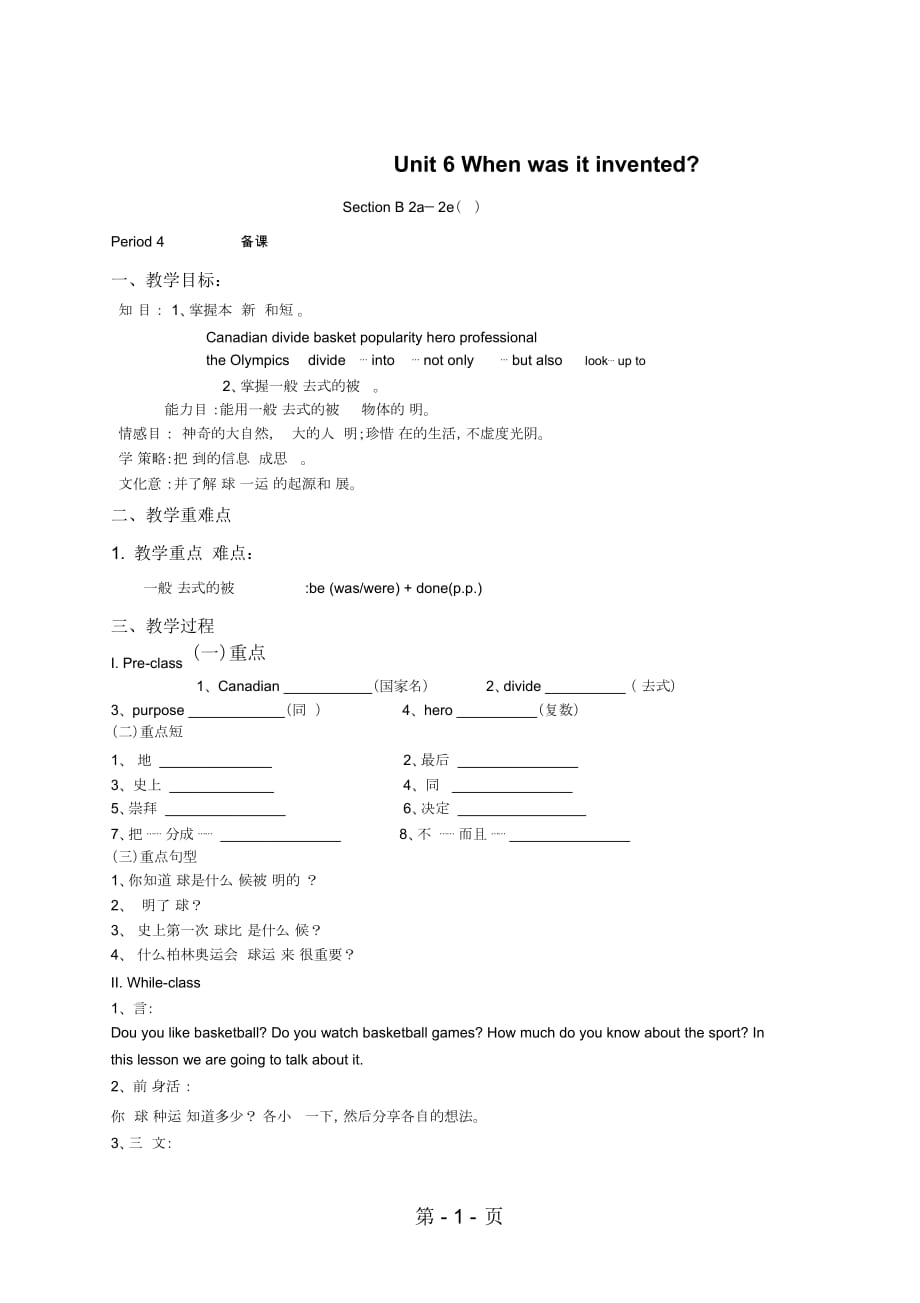《山東省濟(jì)寧兗州第八中學(xué)上學(xué)期人教版九年級(jí)上冊(cè)英語(yǔ)Unit6SectionB2a2e(閱讀課)教案》由會(huì)員分享���,可在線閱讀�,更多相關(guān)《山東省濟(jì)寧兗州第八中學(xué)上學(xué)期人教版九年級(jí)上冊(cè)英語(yǔ)Unit6SectionB2a2e(閱讀課)教案(4頁(yè)珍藏版)》請(qǐng)?jiān)谘b配圖網(wǎng)上搜索。
1�����、
Unit 6 When was it invented?
Section B 2a— 2e( )
Period 4 備課
一�����、教學(xué)目標(biāo):
知 目 : 1�、掌握本 新 和短 。
Canadian divide basket popularity hero professional
the Olympics divide ? into ? not only ? but also look? up to
2���、掌握一般 去式的被 �����。
能力目 :能用一般 去式的被 物體的 明�。
情感
2����、目 : 神奇的大自然, 大的人 明;珍惜 在的生活���,不虛度光陰�����。
學(xué) 策略:把 到的信息 成思 ����。
文化意 :并了解 球 一運(yùn) 的起源和 展��。
二���、教學(xué)重難點(diǎn)
1. 教學(xué)重點(diǎn) 難點(diǎn):
一般 去式的被 :be (was/were) + done(p.p.)
三�、教學(xué)過(guò)程
I. Pre-class (一)重點(diǎn)
1���、 Canadian ___________(國(guó)家名)
2�、divide __________ ( 去式)
3�、 purpose ____________(同 )
4、 hero __________(復(fù)
3�����、數(shù))
(二)重點(diǎn)短
1、 地 ______________
2�����、最后 _______________
3�、 史上 _____________
4�、 同 _______________
5、崇拜 _______________
6���、決定 ________________
7���、把 ?? 分成 ?? _______________
8、不 ?? 而且 ?? _______________
(三)重點(diǎn)句型
1��、你知道 球是什么 候被 明的 �?
2、 明了 球�?
3、 史上第一次 球比 是什么 候�?
4、 什么柏林
4����、奧運(yùn)會(huì) 球運(yùn) 來(lái) 很重要?
II. While-class
1、 言:
Dou you like basketball? Do you watch basketball games? How much do you know about the sport? In this lesson we are going to talk about it.
2��、 前 身活 :
你 球 種運(yùn) 知道多少�? 各小 一下,然后分享各自的想法��。
3�、三 文:
第 - 1 - 頁(yè)
( 1)快速 文,找出每
5��、段的中心意 ��。
( 2)慢 文��,用短文的信息完成思 �����。你 能在思 上加些什么 ���?
Game played inside on a hard ______ / ______ teams
get _______ into other team ’ s ______
Development invented by _______ / first game on ________
became Olympic event in _______ in the year ________
most famous games : ________ / popul
6��、ar games in China : _______
Popularity played by _______ people / over _______ countries
(3)再 文����,用思 的信息回答下列 。
1) Who invented basketball and how is it played ?
2) When was the first basketball game in history played?
3) Why were the Berlin Olympics important for basketball?
4)
7���、 What are the professional basketball groups in America and China?
5) How popular is basketball?
4���、理解 文
教 畫出重點(diǎn)短 和句式,學(xué)生以小 位翻 并 解���。然后學(xué)生展示,教 點(diǎn) �。
5、 后
你如何看待著名的 球運(yùn) ����?列一份關(guān)于作 一名著名的 球運(yùn) 的好的事情和困 的 期的清 。
Good things:
Difficult things:
6 板 :
Unit 6 When was it invented �����?
8����、
Section B 2a---2e
stop sb./sth. From doing sth.
dream of/about (doing)sth.
not only ? but also ?
III. Post-class
背 劃 短 和知 點(diǎn),復(fù)述 文����。
當(dāng)堂
Ⅰ. 根據(jù)句意及所 首字母提示��, 全句中所缺 ����。
1.
Paul was very brave. We all regarded him as a
h
.
2.
Laura added too much salt to the soup. Now it
9����、 tastes too
s
.
3.
The potato chips are thin and
c
. Please have a try.
4.
Many people use cloth bags and bamboo
b
to do their shopping.
5.
Oranges taste sweet and a bit
s
and they are full of vitamin C.
6.
The main purpose of the advertisement is making
c
spend money.
10、
第 - 2 - 頁(yè)
7. Norman Bethune was a C doctor. He was well-known for helping Chinese people
in the war.
Ⅱ. 根據(jù)漢語(yǔ)意思及括號(hào)內(nèi)所給英文提示語(yǔ)��,將下列句子翻譯成英語(yǔ)�����。
1. 喬 (Joe) 夢(mèng)想去歐洲�����。 (dream of)
____________________________________________
2. 我們應(yīng)該阻止吉爾 (Jill) 離開����。 (stop ... from
11、...)
____________________________________________
3.
剛才貝姬 (Becky) 無(wú)意中拿了我的手機(jī)�。
(by mistake)
____________________________________________
4.
大部分年輕人仰慕體育明星和歌星�����。
(look up to)
____________________________________________
5.
這個(gè)工廠有 400 個(gè)工人���。 (the number of)
__________________________
12、__________________
6.
我們英語(yǔ)老師經(jīng)常鼓勵(lì)我們看英語(yǔ)電影�����。
(encourage)
____________________________________________
7. 這個(gè)房間太大了��,因此斯科特 (Scott) 把它隔成了兩間�。(divide ... into ...)
____________________________________________
8. 晚飯后克拉克 (Clark) 先生不僅看電視����,還看書和報(bào)紙。 (not only ... but also ...)
____________________________________________
第 - 3 - 頁(yè)
 山東省濟(jì)寧兗州第八中學(xué)上學(xué)期人教版九年級(jí)上冊(cè)英語(yǔ)Unit6SectionB2a2e(閱讀課)教案
山東省濟(jì)寧兗州第八中學(xué)上學(xué)期人教版九年級(jí)上冊(cè)英語(yǔ)Unit6SectionB2a2e(閱讀課)教案

